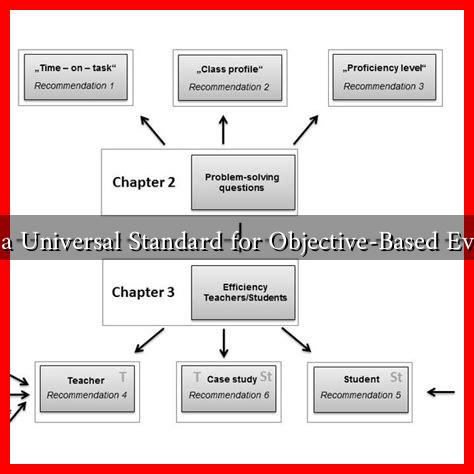-
Table of Contents
Is There a Universal Standard for Objective-Based Evaluation?
Objective-based evaluation is a critical component in various fields, including education, business, and healthcare. It serves as a framework for assessing the effectiveness of programs, initiatives, and individual performance. However, the question remains: is there a universal standard for conducting these evaluations? This article explores the complexities of objective-based evaluation, the existing frameworks, and the challenges in establishing a universal standard.
Understanding Objective-Based Evaluation
Objective-based evaluation focuses on measuring outcomes against predefined objectives. This method is particularly useful for determining whether specific goals have been met and for identifying areas for improvement. The evaluation process typically involves:
- Setting clear, measurable objectives.
- Collecting data related to those objectives.
- Analyzing the data to assess performance.
- Making informed decisions based on the findings.
For instance, in education, a school may set an objective to improve student literacy rates by 20% over a year. The evaluation would involve assessing student reading levels at the beginning and end of the year to determine if the objective was met.
The Need for Standards in Evaluation
Standards in evaluation are essential for several reasons:
- Consistency: Standards ensure that evaluations are conducted uniformly, allowing for reliable comparisons across different programs or organizations.
- Transparency: A standardized approach promotes transparency in the evaluation process, making it easier for stakeholders to understand how conclusions were drawn.
- Accountability: Establishing standards holds organizations accountable for their performance and outcomes.
Existing Frameworks and Standards
While there is no universally accepted standard for objective-based evaluation, several frameworks have been developed to guide the process. Some notable examples include:
- The Logic Model: This framework outlines the relationship between resources, activities, outputs, and outcomes, providing a clear roadmap for evaluation.
- The Kirkpatrick Model: Widely used in training and development, this model evaluates the effectiveness of programs across four levels: reaction, learning, behavior, and results.
- The CIPP Model: Developed by Daniel Stufflebeam, this model focuses on Context, Input, Process, and Product, offering a comprehensive approach to evaluation.
Each of these frameworks has its strengths and weaknesses, and their applicability may vary depending on the context of the evaluation.
Challenges in Establishing a Universal Standard
Despite the existence of various frameworks, several challenges hinder the establishment of a universal standard for objective-based evaluation:
- Diverse Contexts: Different fields and organizations have unique objectives and constraints, making it difficult to apply a one-size-fits-all approach.
- Subjectivity in Measurement: While objectives may be defined objectively, the methods of measuring success can be subjective, leading to inconsistencies in evaluation outcomes.
- Resource Limitations: Organizations may lack the necessary resources or expertise to implement standardized evaluation practices effectively.
Case Studies: Successes and Failures
Examining real-world examples can provide insights into the effectiveness of objective-based evaluations:
- Success: The United Way: The United Way employs a standardized evaluation framework to assess community impact. By using a common set of metrics, they can compare outcomes across different regions and programs, leading to improved resource allocation.
- Failure: Education Reform Initiatives: Many education reform initiatives have struggled due to a lack of standardized evaluation methods. For example, varying state assessments have led to inconsistent measures of student achievement, complicating efforts to gauge the effectiveness of reforms.
Conclusion
In conclusion, while the need for a universal standard for objective-based evaluation is evident, the complexities of diverse contexts, measurement subjectivity, and resource limitations pose significant challenges. Existing frameworks provide valuable guidance, but their effectiveness often depends on the specific circumstances of each evaluation. As organizations continue to seek accountability and transparency, the development of more adaptable and universally applicable standards may become increasingly important. For further reading on evaluation frameworks, you can explore resources from the American Evaluation Association.

